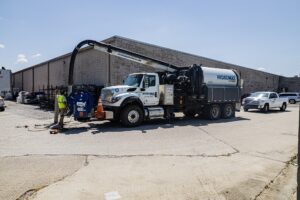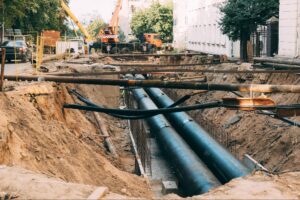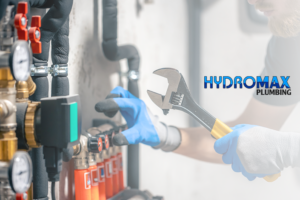A clogged drain can disrupt your day and quickly escalate into a serious issue if left unattended. From slow drainage to unpleasant odors, even a minor blockage can affect your overall comfort and the health of your plumbing system. Choosing the right drain cleaner goes beyond simply clearing the clog—it’s about protecting your pipes, maintaining safety, and being mindful of the environment.
Whether you opt for a do-it-yourself method or a professional service, understanding your options helps you make informed decisions that keep your home running smoothly.
In this guide, we’ll explore why clogs happen, discuss different types of drain cleaners and openers, and offer practical tips on safe DIY approaches. We’ll also share indicators for when you should call in professionals to handle deeper or more persistent problems.
Why Drains Get Clogged Over Time
Even if you’re vigilant about what goes down the drain, there are several factors that contribute to clogs forming over weeks, months, or years. Being aware of these factors can help you select preventive measures and choose an effective solution when a clog does occur.
- Everyday Debris: Bits of food, soap scum, hair, and other particles tend to accumulate on the interior surfaces of your pipes over time. This accumulation narrows the pathway through which water flows, eventually slowing drainage or causing backups.
- Natural Wear and Tear: As pipes age, corrosion or mineral deposits can roughen surfaces, making them more prone to trapping debris.
- Residue Buildup: Substances like fat, grease, and oil can adhere to pipe walls, especially in cooler temperatures when they solidify. This provides a sticky base that traps other particles.
- Irregular Maintenance: When routine cleaning or preventive measures are overlooked, small blockages grow and eventually obstruct an entire line.
Understanding these root causes of clogs makes it easier to select the most suitable drain cleaner. If the buildup is primarily soap scum, for example, your approach may differ from what you’d use on a grease-laden kitchen drain.
The Basics of Drain Clogs
Drains are designed to carry away wastewater from sinks, showers, and appliances, but their capacity has limits. Recognizing common culprits provides a starting point for effective, long-term solutions:
- Hair: Strands of hair, especially in bathroom drains, can mix with soap residue to form dense, slow-draining clumps.
- Grease: Cooking oils solidify as they cool, adhering to pipe walls and trapping food particles or other debris.
- Food Particles: Coffee grounds, vegetable scraps, and other remnants can accumulate in kitchen drains—particularly when not disposed of correctly.
- Soap Scum: Residue from soaps will harden over time, narrowing pipe passages.
A minor inconvenience like slow drainage may not seem pressing, but it can lead to larger plumbing troubles if ignored. Pinpointing the cause of each clog allows you to choose a targeted solution that effectively clears it without causing further damage to your pipes.
Types of Drain Cleaners and Openers

When you need to address a clog, selecting the right method is just as important as recognizing the root cause. The following categories outline the primary approaches to clearing a blockage.
Chemical Drain Cleaners
Chemical cleaners use strong reactive substances (like lye or bleach) to dissolve or dislodge build-ups. They’re known for their speed and ease of use:
- Advantages: Rapid results, often effective on grease or organic debris.
- Disadvantages: Harsh chemicals can damage older pipes, release fumes, and pose environmental risks if overused.
If you’re exploring do-it-yourself options, exercise caution to ensure you’re not unintentionally harming your plumbing or the environment.
Enzymatic Drain Openers
Enzymatic drain openers use natural bacteria and enzymes to break down organic material, such as hair, grease, and soap scum:
- Advantages: Eco-friendly, produce fewer fumes, and are generally safe for older or delicate pipes.
- Disadvantages: Slower reaction times; multiple applications might be necessary for tough or persistent clogs.
Although enzymatic solutions are gentler, they may not clear a severe blockage on the first try. They are, however, an excellent choice for ongoing, preventative maintenance if your clogs are primarily due to organic build-up.
Mechanical Methods
Mechanical solutions rely on physical force or tools—like plungers, drain snakes, and augers:
- Advantages: Avoid chemical use, yield quick results, and are often simple enough for common household clogs.
- Disadvantages: Require some physical effort and proper technique. If used incorrectly, the tools can damage pipes or fixtures.
A plunger is usually your first line of defense. Ensure you’re applying the right amount of force without harming fixtures.


Selecting the Right Drain Cleaner for Your Home
Because no two clogs or plumbing systems are identical, it’s wise to consider a range of factors before you invest in any particular method or product.
- Identify the Clog Source: Is it primarily grease, hair, or food residue? This determines whether a chemical, enzyme-based, or mechanical tool will be the most effective.
- Consider Your Plumbing Age and Material: Older pipes may become corroded or weakened over time; harsh chemicals can accelerate damage. If you have PVC or even older cast iron, check which cleaners are safe.
- Think About Safety and the Environment: If you’re cautious about introducing chemicals into your home or septic system, enzymatic or mechanical methods might be better suited.
- Match the Cleaner to the Severity: A simple kitchen sink clog from leftover food scraps may be fixable with a plunger or enzyme-based cleaner. However, recurring or severe blockages often require more robust solutions—possibly professional assistance.
- Balance Speed with Care: Chemical solutions can yield quick results, making them tempting for a speedy fix. Still, gentler solutions may preserve plumbing integrity over the long haul.
By aligning these considerations with your specific situation, you can narrow down the most appropriate approach and avoid unnecessary damage or frustration.
Maintenance Tips for a Clog-Free System
Many homeowners overlook routine maintenance until a clog becomes unmanageable. By adopting regular upkeep practices, you can significantly reduce the frequency and severity of blockages:
- Hot Water Flushes: Periodically running hot water down drains after use helps dissolve and carry away grease or soap residues.
- Strainers and Screens: Metal or plastic drain screens can catch hair and larger debris, preventing them from entering the pipes.
- Mindful Disposal: Consolidate cooking fats and oils in a container rather than pouring them directly into the sink. Scrape food scraps into a compost or trash bin rather than washing them down the drain.
- Periodic Enzymatic Treatments: Even when you don’t have a visible clog, applying an enzymatic cleaner can break down the minor buildup that accumulates over time.
- Professional Checkups: Scheduling routine plumbing inspections not only helps catch minor issues but also ensures efficient operation of your entire system.
- Extra Step for Longevity: If you’re interested in maintaining your hot water supply and checking for potential issues, explore our Water Heater Maintenance Tips to help extend the life of your equipment.
DIY Tips for Effective and Safe Drain Cleaning
If you’re taking the do-it-yourself route, remember that knowledge and safety go hand in hand. Here are practical pointers for dealing with mild to moderate clogs:
- Start Mechanical: Try a plunger or a basic drain snake first. These methods can resolve many common issues without introducing any chemicals into your drains.
- Follow Product Instructions: If you use a store-bought cleaner—chemical or enzymatic—always read and adhere to the instructions carefully. This includes proper measurements, duration of application, and recommended safety gear.
- Wear Protective Gear: Chemical cleaners, in particular, can cause skin irritation or eye injuries if splashed. Gloves and goggles are a must.
- Avoid Mixing Products: Never combine different types of chemical drain cleaners, as dangerous reactions can occur. If you’ve used one product, thoroughly flush the drain before trying another.
- Know Your Limits: If your efforts fail or the clog reappears quickly, it may be time to call in a professional to avoid further complications.
When to Opt for Professional Plumbing Services

Some clogs signal more extensive underlying issues, requiring the expertise of a licensed plumber. After all, even the most determined DIY enthusiast can’t remedy hidden pipe damage or long-standing obstructions without specialized equipment. Here’s when to involve a professional:
- Mystery Odors and Recurring Backups: Foul odors that persist, even after attempts at cleaning, may indicate larger problems within sewer lines. Recurring blockages could mean a partial collapse, invading tree roots, or hidden buildup.
- Multiple Slow Drains: If you notice that multiple fixtures—like the kitchen sink, shower, and bathroom sink—are draining slowly, this could be a sign of a main line issue.
- Visible Water Damage or Mold: Chronic clogs sometimes point to leaks or cracked pipes behind walls or ceilings. If you notice discoloration, damp spots, or mold growth, you might need a deeper inspection.
- Advanced Tools and Techniques: Professional plumbers can offer specialized services to thoroughly clear and repair lines, such as video camera inspections and hydro-jetting, which are often more efficient and less destructive than repeated DIY attempts.
Specialized Methods
Techniques like video camera inspections let professionals see exactly where the blockage or damage is located without guessing. For stubborn obstructions, high-pressure water jetting can clear out debris by blasting water at high velocities, restoring fluid flow in a timely manner.
If your plumbing lines are old or compromised, mechanical interventions may not suffice. That’s another reason to let professionals assess the integrity of your system. Catching potential fractures or invasive root growth early can spare you from extensive property damage.
Local Professional Plumbing Services: Your Partner for a Clog-Free Home
When facing a persistent plumbing issue, working with a reputable local plumbing service, like Hydromax Plumbing, can make all the difference. Licensed professionals with the necessary equipment are available to handle a wide range of plumbing challenges—from routine clogs to more in-depth repairs.
By consulting experts who are familiar with the condition and layout of local plumbing systems, you can receive tailored advice and service that address both immediate concerns and long-term maintenance needs.
Ensuring Long-Term Plumbing Health
Keeping your drains clear is essential for a comfortable, efficient home. By recognizing common causes of blockages—like grease, hair, food waste, and soap scum—and matching the right solution to your specific situation, you can prevent minor clogs from evolving into major headaches. Simple preventive measures such as using drain strainers, flushing with hot water, and scheduling periodic professional checkups further decrease the likelihood of severe backups.
If you’ve tried to remedy a stubborn clog to no avail—or suspect deeper issues may be at play—it’s time to seek professional evaluation. Contact Hydromax Plumbing to discover how we can perform in-depth diagnostics, ensure immediate relief, and provide lasting peace of mind.




